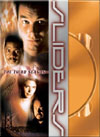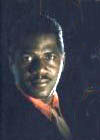DVD Extras include:
Perhaps the most notable thing here is that the long-term events deserve an episode centered primarily on themselves, yet the bulk of this story falls back on the movie-remake crutch that has been so prevalent during the third season. This time around, we're ripping off H.G. Wells' "The Island of Dr. Moreau", which at the time was just coming out as a major motion picture starring Val Kilmer and Marlon Brando. This is a story that has NEVER worked well in any (tele)cinematic adaptation I've ever seen, including the Kilmer/Brando version. Thankfully, Doctor Who's recent attempt in "Utopia" spent less time on the Moreau elements and centered itself on some more interesting ideas.
Empty FluffThere are three big problems with this story. The first pretty much threatens every version of "Island of Dr. Moreau" on the big or small screens. Putting a bunch of actors in make-up and having them jump around like crazy all the time just looks silly. Part of this comes down to the city-boy interpretation of animal behaviour, thinking that the animal's goal is always going to be to attack the humans and be scary. Lessons could be taken from the few actual animals that do appear in this story - they're just chillin' in their cages, making eye contact, calmly assessing the situation - and through their eyes they end up saying more than most of the actors who try to act like animals. Michael York is an actor that I like a lot, and he's done excellent work in nearly everything I've seen him in. However, this story has got to be my least favourite of anything I've seen him in, and it seems to be because he's playing a very one-dimensional character as written, while at the same time being surrounded by unbelievably ridiculous animal reactions at every turn. Without a director taking time to manage such experimental performances far more carefully, it's like playing with matches, and on this occasion, the house burned down. For getting complex wild animal responses correct on TV fiction, Doctor Who's "Survival" remains one of my favourites. And I have to say, Marlon Brando and the host of part-animal characters playing opposite him didn't do too badly in the feature film, where more time had obviously been spent to think through character motivation. Too bad such a small percentage of the feature's actual screen time is spent on this successful element.The second problem is a rampant lack of proactive action plaguing many of the characters. Our four regulars pretty much have diddly squat to do that they can plan and look forward to during this 40-minute Moreau escapade, and their rating on the proactivity meter is about as low as any episode has ever been. Pretty much every turn of event in the story is "Oh, look what's happened to them now" instead of "look what they're doing and working towards now". They get dumped into the sea by the vortex. They get attacked by idiots in make-up acting like city boy animals over and over again. They drop the timer carelessly and ooops, let's NOT just pick it up right away that would be too easy. Let's wait until it becomes a bigger issue. Let's allow the guest characters to decide what happens to us over and over. Ooops, let's walk into Rickman's clutches. But hey, it works both ways, and ooops Rickman just left our cages and both timers unguarded, and Remmy can waltz in without trying hard and make a clean sweep. Look ma, no hands, and we just solved all the long-term goals we've ever had on this show that are still in play! Ugghh! The third problem is very closely related to the second, namely that the few things that the regular characters do actually invest their actions and energies in aren't really achievable or interesting. If the audience isn't disappointed with the goal when it's set, they surely will be when the character fails to achieve anything. Pretty much the only regular character who gets to be proactive today is Rembrandt, who seems to be representing the central explorer/hero from the Moreau story. He does get decent screen time over and above his fellow co-stars. But here the Moreau story lets him down. Very little of what he's emotionally investing in can go to any sort of positive conclusion. Moreau ends in the regrettable destructive bloodbath, and "Sliders" proves no more creative with the concept. Much as I'd usually back heroics over running home any day, Remmy's final attempt really doesn't have anywhere to go this time. He saves Alessandra from no danger, gets her to no safety, doesn't influence the defeats of the villains in any way, and cannot actually DO anything with the time he spends going back for her and then rushing to the slide once more. Bugger all, no thought is being applied to this one. As a side note, I think these later two problems are also the ones that truly turned the Brando/Kilmer feature film into a box office bomb. Both Val Kilmer and David Thewlis play insipid characters who, though they may be accurately nailing some valid character point, are also greatly lacking charisma, and goals, and have little chance of engaging the audience. The camera absolutely needs to be in Kilmer's face if we are to get anything out of his quiet, unenergetic performance, as casting it off in the corner of a large room won't work. Ultimately, who here has goals that the audience can invest in? Perhaps goals got lost in translation from the book, where our main character here is solitary and has no one to share this part of his thought process with. The typical cinematic crutch is to give your protagonist a partner and externalize thoughts as dialogue. "Sliders" has four regulars, and so should be ahead of this problem, yet it still neglects to fill in these large blanks. I will say, the original "Moreau" story tackles some thematic material that has archetypal weight to it, including issues and metaphors of identity and creation, even though it can't really articulate the issues without muddling them horribly. Plot is pretty much a disaster. "Sliders" only manages to extract the control issues, which aren't the most interesting, while chucking the rest of Moreau's intrigue. "Sliders" then follows the plot fairly closely, producing another disaster.
Scattered NitsOf course, aside from the three big problems, there is a long trail of little ones as well. Rickman's entrance appropriately has him demonstrating his usual villainy with the needle, which is important if he is to be at all successful in threatening Wade and company later on, not to mention explaining why he doesn't dispatch his pursuers outright. Though in some ways it's good to see that he's now sporting his most disturbing and degenerated form yet, the wild look of Rickman and his earliest onscreen victim in this story results in one of the worst morph effects ever on the show. If ever the concept for Rickman's villainy showed a complete abandonment of credibility to embrace Hollywood values instead, it is here.In a seemingly desperate move to prop up this empty script, another completely defocused character revelation comes up out of nowhere, this time concerning Maggie's relationship with Rickman. It's ridiculous, it's in very bad taste, and it's totally forgettable as it informs nothing in either character that we've seen before or will see in the future. Let's just cross it out in the script, leave the footage on the cutting room floor, and move on.
Going Home...But even as the bulk of this story turns out to be a load of fluff, you still CANNOT afford to miss this one as you follow the long term story of "Sliders", because if they ever resolved any major arcs on this show, it is here between this story and the next one. In the final 5 minutes, as we leave the "Moreau" rip-off in flames, the story switches to take care of issues relevant to our main characters' journey, and finally becomes worthwhile, essential viewing that manages to be satisfying in its own way. Indeed, this story owes its position in the ranking of this season more to the final five minutes than anything else.Quinn is about to get his friends home, and it feels real. He and Maggie get a great and moving scene, believing they are about to part company, while Wade quietly watches with an admirable and respectful lack of jealousy. The characters are finally back in focus, rewarding the audience for sticking with the journey as it reaches this milestone. Of course 20-20 hindsight tells us that it would have been so much more appropriate if it had been Wade at the center of all those emotional good-byes. This is in fact the last time we see her on "Sliders", though you'd never know it from watching THIS adventure on its own. And to be fair, the writers and producers likely didn't know it at this stage either. It is at least good to see that she is over her quarrel with Maggie for this moment - of course she believes she'll have her Quinn all to herself at home from now on, and they may never see Maggie again. If only she knew what was coming.... Wade and Remmy's long-awaited return home is represented by a single unceremonious push into the vortex, while Wade yelps and is never seen again on the series, and while Quinn keeps both timers. Rickman is finally gotten rid of, without any of the Sliders having to resort to murder. Not bad, but all this is slightly underwhelming. At least big stuff is happening. The final move is also weird, as Quinn and Maggie appear on a strange new world. I have mixed reactions here. Firstly, this new world looks so cool and sci-fi, I wish the entire season three finale could have been set here instead of on the Island of Dr. Vargas. But on the other hand, are these two characters being dumped here because the writers still don't have the confidence to totally end the initial return-home arc? Or are they just trying to leave too many options open in terms of casting and series direction for the next season? Personally, I think they could have been bolder, and gone straight for the home universe. But it doesn't really matter. There is a fourth season, with an opener that deals with most of the loose ends left dangling here. And then... everything changes. Stay tuned, and don't miss it.
This story has become available on DVD. Click on the Amazon symbol for the location nearest you for pricing and availability:
Comments on this article are welcome. You may contact the author from this page:
|









